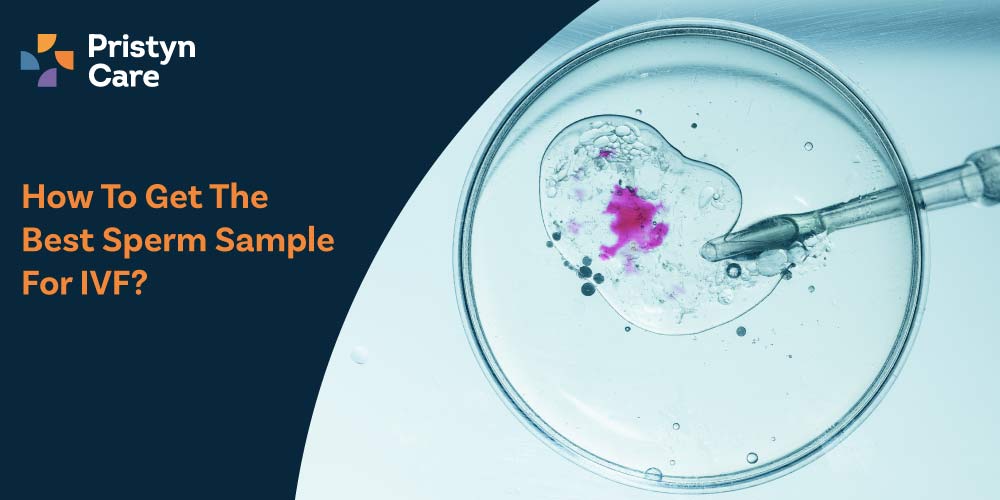
Achieving a successful in vitro fertilisation (IVF) outcome often hinges on the quality of the sperm sample provided. The quest for excellence in this initial step can significantly boost the chances of conception. How to get the best sperm sample for IVF is a question of paramount importance that involves understanding both the biological and environmental factors that influence sperm health.
In this article, we will get into the critical steps men can take to optimise their sperm quality. From lifestyle modifications to the specifics of the collection process, each element plays a vital role. Join us as we explore the science-backed strategies and expert advice to ensure you are providing the best possible sample, enhancing your journey towards fatherhood through IVF.
Table of Contents
Understanding Sperm Health
The health of sperm is crucial in determining the effectiveness of in vitro fertilisation (IVF). Several factors can influence sperm quality, including genetic makeup, lifestyle choices, and environmental exposures. Primarily, sperm health is evaluated through key parameters: motility, count, and morphology.
Motility refers to the sperm’s ability to move efficiently; this is vital for successful fertilisation, as sperm need to travel through the female reproductive tract to reach and penetrate the egg. Count, or concentration, measures the number of sperm cells in a semen sample. A higher count increases the likelihood of egg fertilisation.
Morphology, the shape and structure of sperm, is another critical parameter. Abnormal morphology may impair the sperm’s ability to fertilise an egg effectively.
Understanding and optimising these parameters are fundamental in preparing for IVF, as they significantly impact the chances of successful conception.
Preparation for Sperm Collection
Preparing to collect a sperm sample for IVF involves meticulous planning and specific lifestyle adjustments to ensure the quality of the sperm is optimised. This preparation is crucial in enhancing the sample’s viability and fertility potential.
Timing and Frequency of Ejaculation
Proper timing and managing the frequency of ejaculation can significantly influence sperm quality. It’s generally recommended to abstain from ejaculation for two to three days before collecting a sperm sample.
This abstention period allows for an accumulation of sperm, increasing both volume and concentration, which are critical for a successful IVF process. However, prolonged abstinence can adversely affect sperm vitality and motility, so balance is key.
Lifestyle Adjustments for Optimal Sperm Health
Making lifestyle changes is essential for improving sperm health. Key adjustments include:
- Avoiding heat exposure: High temperatures can impair sperm production. Avoid hot baths, saunas, and tight clothing.
- Reducing stress: Chronic stress can decrease sperm quality by affecting hormones that trigger sperm production.
- Limiting alcohol and quitting smoking: Both habits are linked to reduced sperm count and motility.
- Exercising regularly: Moderate physical activity can boost testosterone levels and improve sperm health, but excessive exercise could have the opposite effect.
Nutritional Recommendations
Nutrition plays a pivotal role in enhancing sperm quality. A diet rich in specific nutrients can improve all sperm parameters:
- Zinc: Found in meat, fish, and legumes, zinc is crucial for testosterone production and sperm development.
- Antioxidants: Vitamins E and C, found in fruits and vegetables, protect sperm from cellular damage.
- Omega-3 fatty acids: Present in fish and flaxseeds, they improve sperm membrane fluidity and motility.
- Folic acid: Supports sperm genetic material integrity and is found in green leafy vegetables.
Each of these factors directly impacts the success rate of IVF treatment. When preparing for “how to collect sperm sample for IVF,” it’s vital to consider these elements to enhance the overall effectiveness of the sperm sample provided.
Methods of Sperm Collection
The method of sperm collection is a critical factor in the success of IVF treatments. Choosing the right technique can enhance the quality of the sperm sample, thereby increasing the chances of successful fertilisation.
Masturbation: Most Common Method
Masturbation is the preferred and most common method for collecting sperm due to its simplicity and non-invasiveness. It allows for the collection of sperm in a natural state without any medical interventions. Key aspects to consider include:
- Environment: Ensuring a private, comfortable setting is crucial for effective sample collection.
- Hygiene: Washing hands and the genital area prior to collection reduces the risk of contamination.
- Collection container: Use a sterile container provided by the clinic to avoid sample degradation.
Alternative Collection Methods
For individuals who cannot collect sperm through masturbation due to medical, psychological, or religious reasons, alternative methods are available:
- Surgical extraction: Techniques such as Testicular Sperm Extraction (TESE) or Percutaneous Epididymal Sperm Aspiration (PESA) are used when ejaculation is not possible or when sperm cannot pass normally through the reproductive tract. These methods are invasive and typically reserved for severe cases of male infertility.
- Use of condoms designed for sample collection: Special non-toxic condoms allow for sperm collection during intercourse. These condoms do not contain substances that typically harm sperm, making them suitable for IVF processes.
Each collection method has its considerations and should be chosen based on the individual’s specific health profile and circumstances. Understanding how to get the best sperm sample for IVF involves selecting the appropriate collection method that aligns with the individual’s medical history and personal preferences, ensuring the highest quality of the sperm for IVF procedures.
Tips for Sample Collection Day
The day of sperm sample collection is pivotal for successful IVF outcomes. Proper preparation and awareness of environmental factors can significantly enhance the quality of the sample.
Mental and Physical Preparation
The mental and physical state of an individual can directly impact sperm quality. To ensure optimal results:
- Relaxation Techniques: Practise deep breathing, meditation, or other relaxation techniques to reduce stress and anxiety, which can adversely affect sperm production and quality.
- Adequate Sleep: Ensure a good night’s sleep before the collection day to improve overall sperm health and vitality.
- Abstinence: Follow the clinic’s guidance on abstinence from ejaculation for 2-3 days prior to sample collection to maximise sperm count and potency.
Environmental Factors to Consider
The environment in which the sperm sample is collected can also play a crucial role in its quality. Attention to detail can prevent contamination and ensure the integrity of the sample:
- Temperature: Keep the room at a comfortable temperature; excessive heat can negatively affect sperm quality.
- Cleanliness: The collection area should be clean and free from contaminants like dust and chemical vapours, which can impair sperm quality.
- No Lubricants: Avoid using any lubricants, unless specifically approved by the fertility clinic, as many contain chemicals that can damage sperm.
Ensuring that both physical comfort and mental calm are addressed on the day of sperm collection will help obtain a high-quality sample, crucial for the success of IVF treatments.
Handling and Transporting the Sample
The manner in which a sperm sample is handled and transported to the clinic is critical in preserving its integrity and ensuring its viability for IVF. Proper techniques and precautions must be adhered to from the moment of collection to delivery at the clinic.
Immediate Steps After Collection
Once the sperm sample is collected, immediate action is necessary to maintain its quality. Consider the following:
- Temperature Control: Keep the sample at body temperature. Avoid exposure to extreme cold or heat, which can damage the sperm.
- Sealing and Labelling: Seal the container tightly immediately after collection and ensure it is correctly labelled with all required information to prevent any mix-ups at the clinic.
- Avoid Delays: Process or refrigerate the sample according to clinic instructions if there is going to be any delay in transporting it to the clinic.
Transporting the Sample to the Clinic: Do’s and Don’ts
Transporting the sperm sample to the fertility clinic is a delicate phase where specific precautions should be taken:
- Do’s:
- Transport Directly: Take the sample to the clinic immediately after collection to minimise the time outside a controlled environment.
- Keep It Upright: Always keep the container upright to reduce the risk of leakage.
- Use a Thermal Bag: If travelling long distance, use a thermal bag to maintain a stable temperature.
- Don’ts:
- Avoid Shaking: Minimise movement during transportation as jostling can damage sperm cells.
- Don’t Freeze Without Guidance: Never freeze the sample unless specifically directed by fertility specialists.
- Avoid Exposure: Keep the sample away from direct sunlight and other sources of heat.
Adhering to these guidelines ensures that the sperm sample for IVF isn’t compromised by the handling and transportation process. Proper care can significantly affect the sample’s viability and, ultimately, the success of the IVF procedure.
Common Problems and Solutions
When preparing for IVF, couples often face a range of challenges that can impact the quality of the sperm sample. Identifying common issues and implementing effective solutions is crucial for enhancing fertility outcomes.
Dealing with Low Sperm Count or Poor Motility
Low sperm count and poor motility are significant hurdles in achieving successful IVF. To improve these parameters:
- Consult a Specialist: Seek advice from a fertility expert who can recommend treatments or supplements.
- Lifestyle Changes: Increase physical activity and reduce exposure to toxins like smoking and excessive alcohol.
- Temperature Management: Avoid hot baths and tight clothing that increase scrotal temperature, potentially harming sperm health.
Addressing Emotional and Psychological Challenges
The IVF process can be stressful, affecting emotional and psychological well-being, which in turn can impact sperm quality.
- Open Communication: Discuss feelings and stresses with your partner or a counsellor to manage emotional burdens.
- Stress Management Techniques: Engage in mindfulness, meditation, or yoga to reduce stress levels.
- Support Groups: Consider joining a support group for individuals going through IVF to share experiences and coping strategies.
Conclusion
Getting the best sperm sample for IVF involves a comprehensive approach that combines optimal physical preparation, mindful lifestyle choices, and meticulous handling of the sample. Addressing psychological stressors and maintaining a supportive environment are equally crucial.
By adhering to the strategies outlined in this guide, individuals can enhance their sperm quality significantly, thus increasing the likelihood of IVF success. While the process may require dedication and patience, the efforts are well worth it when aiming for the best possible outcome in your journey toward parenthood.
FAQs
Q1. What is the ideal temperature for storing a sperm sample before it reaches the lab?
The ideal temperature to store a sperm sample before transporting it to the lab is close to body temperature, around 20-25°C (68-77°F). Storing the sample within this range helps preserve sperm viability during transit.
Q2. How long can a sperm sample remain viable after collection?
A sperm sample can remain viable for a short period after collection, typically a few hours. However, it is recommended to transport the sample to the IVF lab as quickly as possible to ensure maximum viability and effectiveness for the IVF procedure.
Q3. Is there any risk associated with frequent electromagnetic exposure from laptops or mobile phones concerning sperm health?
Some studies suggest that prolonged exposure to electromagnetic fields from laptops or mobile phones could potentially affect sperm quality by reducing motility and altering DNA integrity. It’s advisable to limit direct lap exposure to devices.
Q4. What role does age play in sperm quality for IVF?
Age can influence sperm quality, with a decline often seen as men get older. Older age can affect motility, morphology, and sperm DNA integrity. Men over 40 may need to take additional steps to optimise their sperm health for IVF.
Q5. How does sleep affect sperm quality?
Adequate sleep is crucial for optimal sperm production. Lack of sleep can disrupt hormone levels and increase oxidative stress, both of which can impair sperm quality. Ensuring 7-9 hours of quality sleep per night is beneficial for maintaining healthy sperm.











